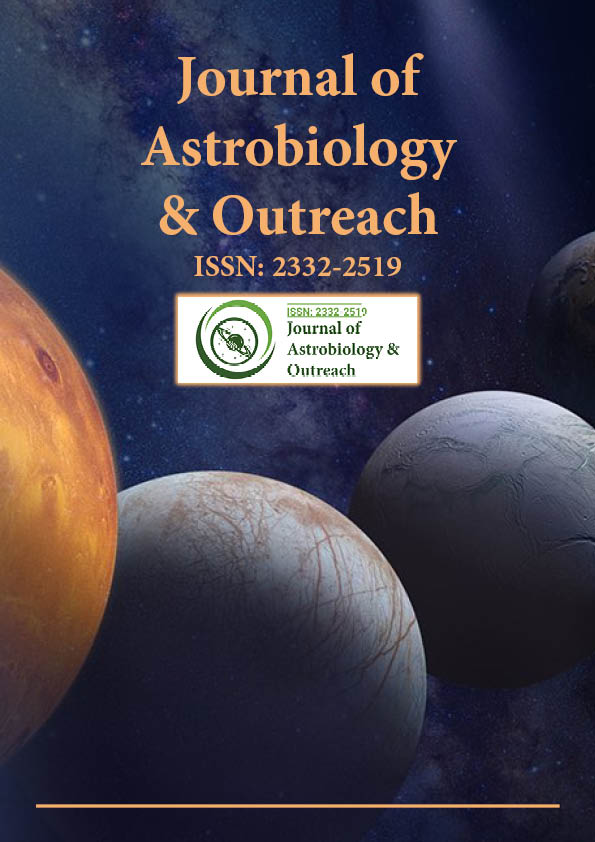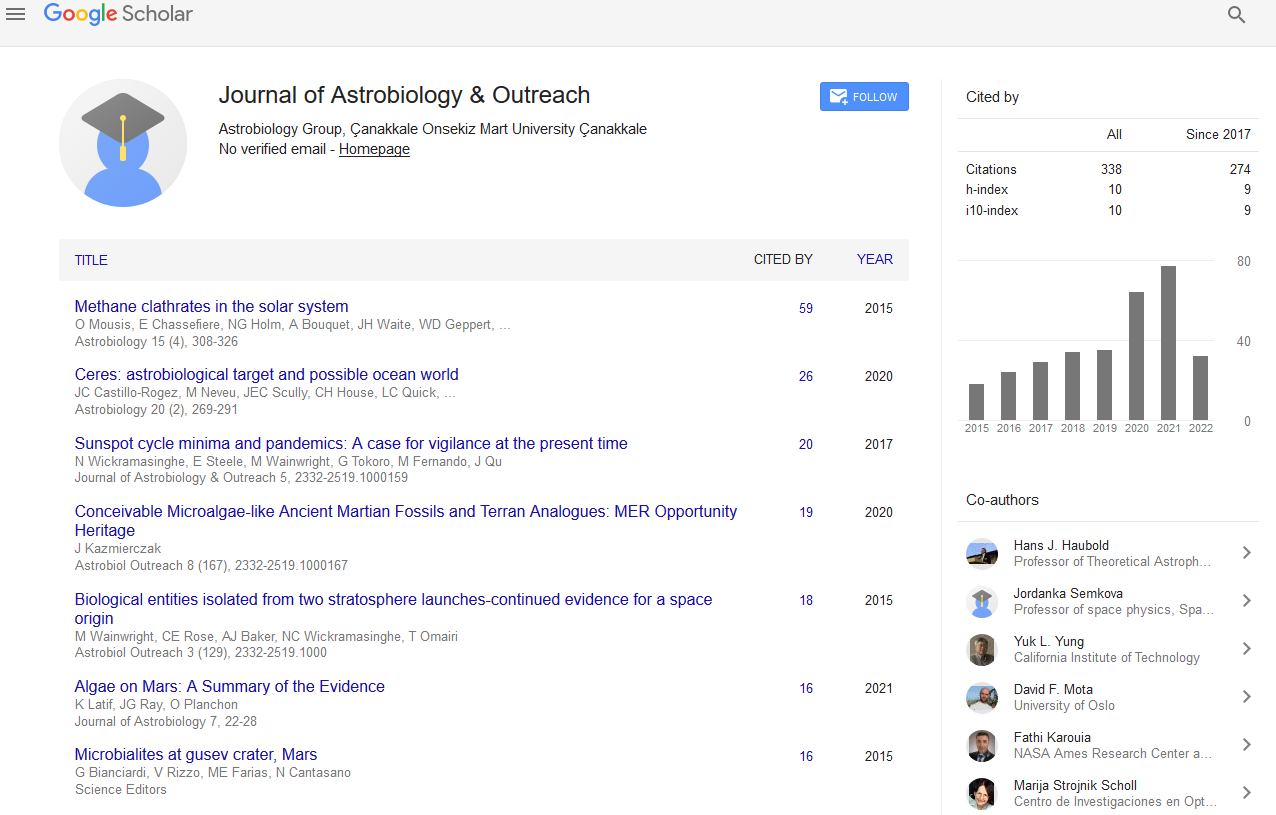Indexed In
- Open J Gate
- Academic Keys
- JournalTOCs
- RefSeek
- Hamdard University
- EBSCO A-Z
- OCLC- WorldCat
- Google Scholar
Useful Links
Share This Page
Journal Flyer

Open Access Journals
- Agri and Aquaculture
- Biochemistry
- Bioinformatics & Systems Biology
- Business & Management
- Chemistry
- Clinical Sciences
- Engineering
- Food & Nutrition
- General Science
- Genetics & Molecular Biology
- Immunology & Microbiology
- Medical Sciences
- Neuroscience & Psychology
- Nursing & Health Care
- Pharmaceutical Sciences
Commentary - (2023) Volume 11, Issue 3
An Ethical Guide for Astrobiology's Exploration: A Manifesto on Complexity
Jons Lissau*Received: 01-May-2023, Manuscript No. JAO-23-21757; Editor assigned: 03-May-2023, Pre QC No. JAO-23-21757 (PQ); Reviewed: 17-May-2023, QC No. JAO-23-21757; Revised: 24-May-2023, Manuscript No. JAO-23-21757 (R); Published: 31-May-2023, DOI: 10.35248/2332-2519.23.11.296
Description
Astrobiology, the interdisciplinary field that explores the possibility of life beyond Earth, poses profound questions about our place in the universe and our responsibilities as its inhabitants. While the search for extraterrestrial life continues to captivate our imagination, it also raises ethical considerations that shape our approach to astrobiology. This study examines the concept of "manifest complexity" as a potential foundational ethic for astrobiology. By embracing an ethic centered on the interconnectedness and preservation of complex life, we can guide our exploration of the cosmos with a sense of responsibility and a deep appreciation for the intricate tapestry of life.
Understanding manifest complexity
Manifest complexity, as an ethic for astrobiology, acknowledges the intricate and interconnected nature of life in the universe. It recognizes that life is not simply a collection of individual organisms but a complex web of relationships and systems that sustain and promote biodiversity. This ethical framework emphasizes the preservation and protection of life's diversity and complexity as a fundamental value.
Astrobiology strives to uncover the conditions necessary for life to arise and persist, and in doing so, it discovers the astonishing diversity of environments and organisms that exist on Earth. By recognizing the complexity and interconnectedness of life, astrobiology underscores the importance of safeguarding and respecting the delicate balance of ecosystems, both on our planet and potentially elsewhere in the universe.
Preservation of complex life
The ethic of manifest complexity encourages us to consider the preservation of complex life as a primary goal in astrobiological endeavors. This perspective prioritizes the protection of habitats and ecosystems that foster the evolution and sustenance of diverse life forms. It calls for responsible exploration that minimizes potential harm to environments and ensures that our actions do not disrupt the delicate ecological balance.
Furthermore, manifest complexity prompts us to consider the potential impact of our search for extraterrestrial life on existing ecosystems. As we explore other celestial bodies, such as Mars or the Moons of Jupiter and Saturn, we must carefully evaluate the risk of contamination and take measures to prevent unintended consequences that could disrupt or endanger potential habitats.
Interdisciplinary collaboration
Manifest complexity also highlights the significance of interdisciplinary collaboration in astrobiology. To fully comprehend the complexity of life and ecosystems, scientists from various fields, including biology, chemistry, geology, and astronomy, must be in oneness. This collaborative effort allows for a more comprehensive understanding of the factors that contribute to life's origin and persistence, while promoting ethical considerations in the pursuit of knowledge.
Ethical implications and social responsibility
Embracing manifest complexity as a foundational ethic for astrobiology raises important ethical implications and underscores our social responsibility. As we explore the cosmos, we must actively engage in ethical discussions and ensure that our actions align with principles of environmental stewardship and respect for life.
Additionally, astrobiology has the potential to inspire societal reflection and stimulate philosophical discussions about the in the universe. By adopting an ethic of manifest complexity, we encourage a broader consideration of actions and their implications for life, both on earth and beyond.
Conclusion
Manifest complexity offers a compelling ethical framework for astrobiology, emphasizing the interconnectedness and preservation of complex life. By recognizing the intricate tapestry of life and promoting responsible exploration, we can approach astrobiological endeavors with a deep sense of reverence and stewardship. This foundational ethic prompts us to value and protect the diverse ecosystems that sustain life on earth and guides us to understand the potential for life elsewhere in the universe. By embracing manifest complexity, we embark on an ethical journey that intertwines scientific exploration with the profound responsibility to safeguard and nurture the intricate beauty of life in all its forms.
Citation: Lissau J (2023) An Ethical Guide for Astrobiology's Exploration: A Manifesto on Complexity. J Astrobiol Outreach. 11:296.
Copyright: © 2023 Lissau J. This is an open-access article distributed under the terms of the Creative Commons Attribution License, which permits unrestricted use, distribution, and reproduction in any medium, provided the original author and source are credited.

